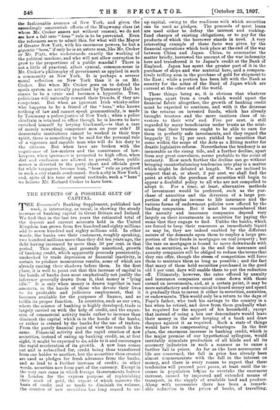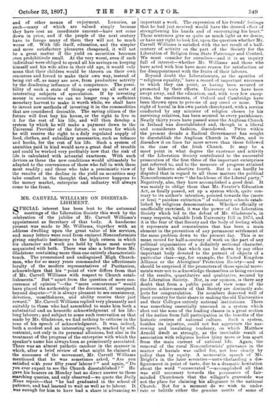THE EFFECTS OF A POSSIBLE GLUT OF CAPITAL.
TBE Economist's Banking Supplement, published last week, is interesting, as usual, in showing the steady increase of banking capital in Great Britain and Ireland. We find that in the last ten years the estimated total of the deposit and current accounts held in the United Kingdom has grown from five hundred and eighty millions odd to seven hundred and eighty millions odd. In other words, the banks owe their customers, roughly speaking, two hundred millions more than they did ten years ago, the debt having increased by more than 30 per cent, in that period. This steady, and generally unnoticed, growth of banking credit, which apparently proceeds persistently, unchecked by trade depression or financial inactivity, is certain to produce momentous results, some of which are already casting their shadows before them. In the first place, it is well to point out that this increase of capital in the hands of banks does most emphatically not justify the inference generally drawn from it, that money is "lying idle." It is only when money is drawn together in vast amounts, in the hands of those who devote their lives to its profitable and judicious employment, that it becomes available for the purposes of finance, and so fulfils its proper function. In countries, such as our own, where the science of banking is highly developed, trade is largely carried on with the help of credit, and the expan- sion of commercial activity tends rather to increase than diminish the capital which is in the hands of the banks, or rather is created by the banks for the use of traders. From the purely financial point of view the result is the same. Financial activity and the rapid creation of new securities, instead of eating up banking credit, as, at first sight, it might be expected to do, adds to it and encourages the rapid acceleration of its growth. A new loan comes out and is subscribed for, credit being thus transferred from one holder to another, but the securities thus created are used as pledges for fresh advances from the banks, and so lead to a further increase of credit; in other words, securities now form part of the currency. Except in the very rare cases in which foreign Governments borrow in .London for the express purpose of replenishing their stock of gold, the export of which narrows the basis of credit and so tends to diminish its volume, the creation of new securities has long ceased to use up capital, owing to the readiness with which securities can be used as pledges. The proceeds of most loans are used either to defray the interest and sinking. fund charges of existing obligations, or to pay for the products of which the borrower stands in need. A very interesting example of these facts was given by the financial operations which took place at the end of the war between China and Japan. China, to summarise the matter briefly, borrowed the amount of the war indemnity, here and transferred it to Japan's credit at the Bank of England. Japan has spent the greater part of it in the purchase of ships and war material here, and a compara- tively trifling sum in the purchase of gold for shipment to the East ; while a portion has been left with the Bank as security for the notes of the Bank of Japan which are current at the other end of the world.
These things being so, it is obvious that whatever happens, apart from a crash which would upset the financial fabric altogether, the growth of banking credit must be expected to continue, and with it the decrease in the returns on invested funds, which has already brought trustees and the more cautious class of in- vestors to their wits' end. Five per cent, is still regarded by many beneficiaries under trusts as the mini- mum that their trustees ought to be able to earn for them in perfectly safe investments, and they regard the beggarly 2i to 21 per cent, yielded by securities that come within the scope of the Acts as a fitting matter for drastic legislative reform. Nevertheless the tendency is as inexorable as the rising tide, and a further decline, apart from any great convulsion, seems probable to the point of certainty. How much further the decline can go without bringing counterbalancing tendencies into play is a matter which might be debated at length. We are inclined to suspect that at, or about, 2 per cent, we shall find the point at which the purchase of securities will begin to appear a doubtful policy to all who are not compelled to adopt it. For a time, at least, alternative methods of investment would be preferred, such as the pur- chase of annuities and the diversion of a large pro- portion of surplus income to life insurance and the various forms of endowment policies now offered by the leading companies. But it must be remembered that the annuity and insurance companies depend very largely on their investments in securities for paying the sums that they engage to find. Unlike the banks, which are forced to keep their resources as immediately liquid as may be, they are indeed enabled by the different nature of the demands upon them to employ a large pro- portion of their funds in mortgages on real property ; but the rate on mortgages is bound to move downwards with that on securities, so that in the end the insurance and annuity companies will be obliged to reduce the terms that they can offer, though the stress of competition will force them to maintain them as long as possible ; and the fact that many of them hold securities purchased in the good old 5 per cent. days will enable them to put the reduction off. Ultimately, however, the rates offered by annuity and insurance companies must come down with those earned on investments, and, at a certain point, it may be more satisfactory and economical to hoard money and spend it gradually than to invest it either in securities, annuities, or endowments. This would only be a return to the days of Pope's father, who took his savings to the country in a box when he retired, and drew from them gradually what he required for the support of his household; except that instead of using a box our descendants would leave their money in the safer keeping of a bank and draw cheques against it as required. Such a state of things would have its compensating advantages. In the first place, the enormous increase in banking credit, which is the major premise of our hypothetical syllogism, would inevitably stimulate production of all kinds and all its accessory industries in such a manner as to cause a further fall in prices. As far as the bare necessaries of life are concerned, the fall in price has already been almost commensurate with the fall in the interest on money, and there is every reason to expect that these tendencies will proceed pant pa,ssu, at least until the in- crease in population begins to overtake the enormous increase, caused by improved and extended means of transport, in the supply of available land and produce. Along with necessaries there has been a remark- able reduction in the prices of books, of travelling, and of other means of enjoyment. Luxuries, as such—many of which are valued simply because they have cost an inordinate amount—have not come down in price, and if the people of the next century have to forego many of them they will not be much worse off. With life itself, education, and the simpler and more satisfactory pleasures cheapened, it will not be a great matter if the yield on securities becomes even prohibitively small. At the very worst, even if each individual were obliged to spend all his savings on keeping himself and his wife alive in their old age, it would only mean that their children would be thrown on their own resources and forced to make their own way, instead of being cut off, as many are now, from productive activity by the deadening influence of a competence. The possi- bility of such a state of things opens up all sorts of interesting subjects of speculation. If by investing money in securities we can no longer reap a sufficient monetary harvest to make it worth while, we shall have to invent new methods of investing it in the commodities that are considered desirable. The saving citizen of the future will first buy his house, or the right to live in it for the rest of his life, and will then develop a system by which he will make a payment down to the Universal Provider of the future, in return for which he will receive the right to a duly regulated supply of food, clothes, and subsidiary necessaries, such as tobacco and books, for the rest of his life. Such a system of annuities paid in kind would save a great deal of trouble and could be worked very profitably now that the risk of life is calculated with actuarial exactness. With such devices as these the new conditions would ultimately be adapted to the convenience of those who fall in with them most readily ; and those who take a pessimistic view of the results of the decline in the yield on securities may take comfort in the thought that, whatever happens to the money market, enterprise and industry will always come to the front.











































 Previous page
Previous page